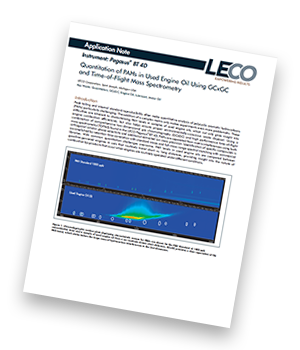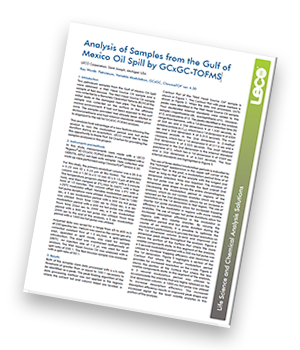At LECO’S GC×GC Workshop & Symposium (filmed at the LECO European Application and Training Centre, Berlin, Germany) Paul Harvath gave a talk entitled "Evaluation of Oxidized Base Oils by Flow Modulated Two-Dimensional Gas Chromatography – Time of Flight Mass Spectrometry". In his talk he gave an insight about the history and future of engine oils for cars, and how the lubricants changed over the times.
The talk outlined the challenges the industry is facing and explains how those challenges are being approached. Besides the introduction of the oil sample preparation, Paul Harvath compared the work with the LECO FLUX Flow Modulator with the traditional LECO Liquid Nitrogen based modulation and presents the benefits of both technologies. He also gave an insight into the vast advantages of GC×GC technology for his work which could be seen in the data evaluation.
Click on the video image below to view this presentation.

By viewing this presentation you will learn more about:
- advantages in GC×GC and TOF technology compared to one dimensional gas chromatography
- sample preparation
- introduction of the flow modulation technology
- importance of data quality.
About the presenter
 Paul Harvath
Paul Harvath
(Added Dimension Consulting, USA)
Paul Harvath worked for General Motors in Michigan for 37 years and was responsible for the development of GM dexos™ engine oil specifications.
You may also be interested in these application notes ...
 Quantitation of PAHs in Used Engine Oil Using GCxGC and Time-of-Flight Mass Spectrometry
Quantitation of PAHs in Used Engine Oil Using GCxGC and Time-of-Flight Mass Spectrometry
This application note describes how using a combination of GCxGC and high performance TOFMS, PAHs are separated from matrix interferences using both orthogonal column phase selectivity and additional extracted ion mass precision.
 Analysis of Samples from the Gulf of Mexico Oil Spill by GCxGC-TOFMS
Analysis of Samples from the Gulf of Mexico Oil Spill by GCxGC-TOFMS
This application note describes the evaluation of two petroleum samples from the Gulf of Mexico Oil Spill using GCxGC-TOFMS. This technique enables the large number of individual components to be resolved and identified in a single analysis,
For more information from LECO visit https://eu.leco.com/






